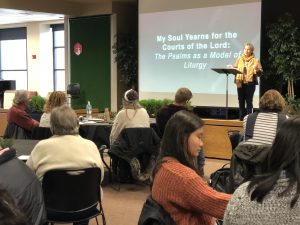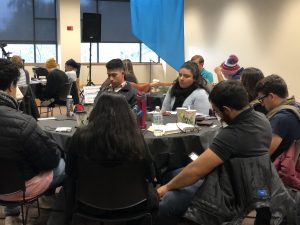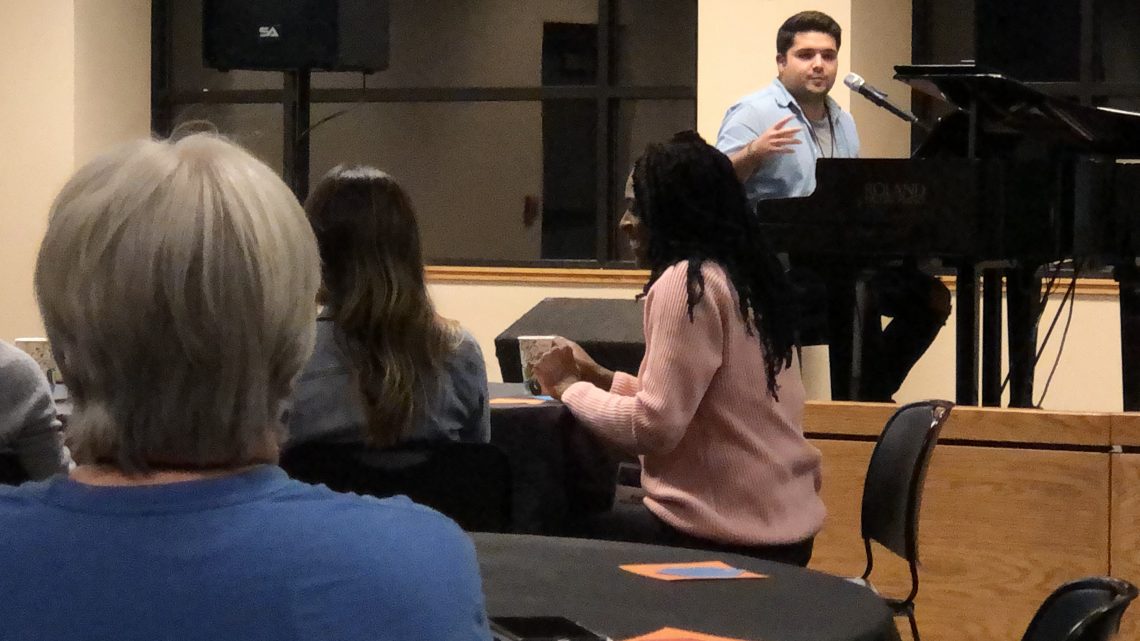Over 60 attendees gathered at the College View Church in Lincoln, Nebraska Oct. 31-Nov. 2, 2019 for the second Response Worship Summit, focused this year on the book of Psalms as a means of inspiring and informing worship. The three-day event included a variety of international presenters, biblical preaching, discussion for equipping local worship leaders, and time for worship experiences.
Summit participants (more than double the first year’s number) represented a range of ages and cultures and a fairly equal mix of men and women. The event, geared toward pastors, elders, worship leaders and members who want to focus more on worship, was sponsored by the College View Church, AdventSource, the Kansas-Nebraska Conference and the North American Division.
“Response is an Adventist initiative for advancing a gospel-founded, God directed, biblically rich vision of worship,” said Pastor Deneil Clarke, event co-organizer and worship pastor at CVC. He added that the summit is intended to be a blend of worship theory and practical application of theories. During her opening remarks, Pastor Kessia Reyne Bennett, discipleship pastor for CVC said, “Welcome to the most Christian of all activities—worship!”
A Focus on Relationships
While the first summit in 2018 explored a more broad based introduction to worship throughout various books of the Bible, the 2019 summit focused on the theology and practice of worship in Psalms, particularly as it relates to the life, death and resurrection of Jesus portrayed in the gospels.
Tiago Arrais, a pastor originally from Brazil who is now serving in Santa Fe, New Mexico, said during his presentation that “Jesus is the embodiment of everything humanity cries out for in the Psalms.” Arrias stated that Jesus quoted from Psalms more than any other book of the Bible, and added that while much of the Old Testament is messages from God to humanity, Psalms is humans reaching out for a relationship with God. “We are created to be religious beings,” he said, and the Psalms shows us the underlying values that shape worship.
Arrais went on to add that worshipers are guests in the house of God. “There is no attitude of ownership or entitlement. Christ is the head of the house, the church.”
Another biblical principle that Tiago presented was that true worship is inherently tied to how we treat one another. “When we leave the temple, we carry out to others peace, light, forgiveness, healing. In the new order of the gospel, we become living temples where every function of the old temple services takes place in the heart and life,” he said.
Activity and Engagement
In between presentations, attendees were encouraged to participate in singing and reading from the Scriptures. There was also time for small group discussion around the table on questions such as What song has been a source of strength for you during difficult times in your life? and What song do you associate with life celebrations?
Attendees were also invited to write a prayer to God and to write prayer requests on slips of paper throughout the event to be pinned to the prayer wall near the entrance to the gathering room.
The Psalms as Liturgy
Lilianne Doukhan, professor emeritus of music and former chair of the Music Department at Andrews University, presented on the Psalms as a model for liturgy. Drawing on her lifelong experience as a church musician and minister of music, Dr. Doukhan stated that “we [Seventh-day Adventists] are not a liturgical church. We have a simple, traditional order of worship and trying to do new things is always a challenge.”
Dr. Doukhan went on to say that “worship should provide food for the soul of the worshiper. The liturgy should offer biblical truth and a fuller understanding of worship. True worship is not about the sacrifice one brings. It is about a humble spirit. It is about not focusing on my will in worship, but God’s will.”
While preparing for this lecture, Doukhan said she read all 150 psalms in one week. “The psalms are a treasure trove of ideas for group worship,” she stated. She went on to show how singing the Scriptures is an ideal form of worship. “The word of God used in singing, praying and reading will touch worshipers’ hearts and change their lives. The only thing we need for worship is the Word of God.” Doukhan reminded participants that worship leaders should immerse themselves in the Word of God every day, living in constant contact with God so His love and character radiate out from them to others on the Sabbath.
Creating an Impact
Other presenters discussed the use of various genres of music in worship, and breakout session topics included art and drama in worship, planning liturgy, creative hymnody, and how to prepare a praise ensemble.
Dr. Devon Howard, a renowned organist and music department chair at Southwestern Adventist University in Keene, Texas, brought nearly 20 students from the university to participate in the summit as part of a new course being taught on campus this year titled Survey of Christian Worship.
“I’m glad we sat in the van so long to get here,” said one student. “I’m seeing the Psalms from a different perspective and how we can cling to them because of Jesus.”
Another student expressed that the summit was “really powerful with lots of takeaways ” while a participant from Kansas commented that he found the presentations eye opening and was excited about the possibilities for practical implementation in his local church.
Plans for next year’s worship summit are already underway, and will draw inspiration from worship themes in the book of Revelation.
For more information visit https://www.responsesummit.org/











